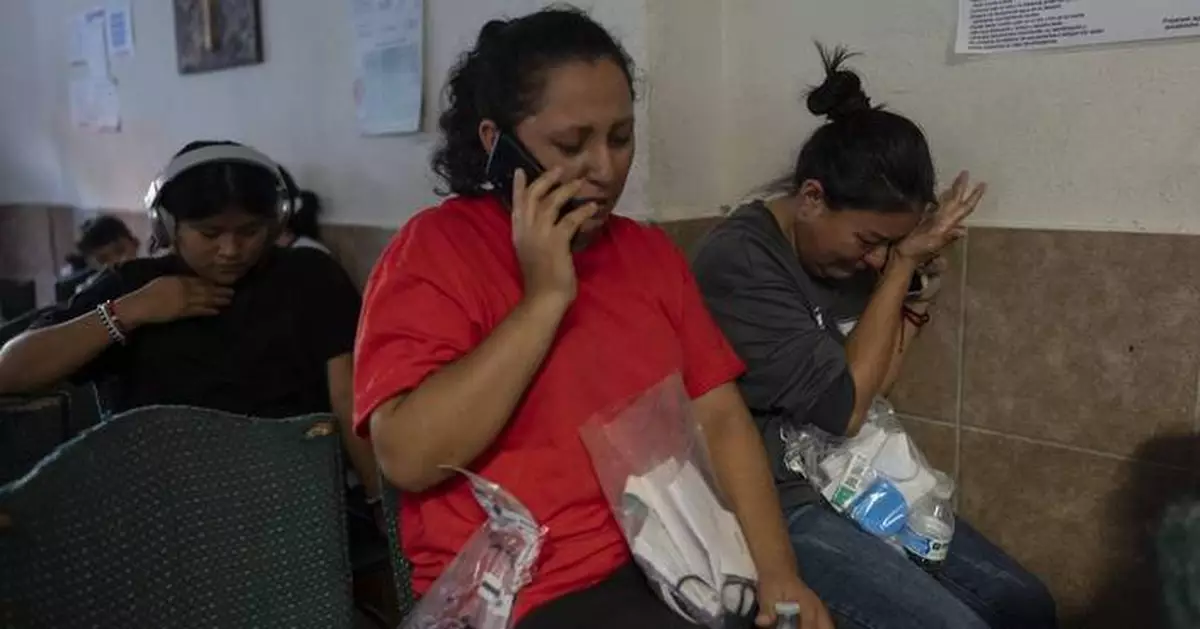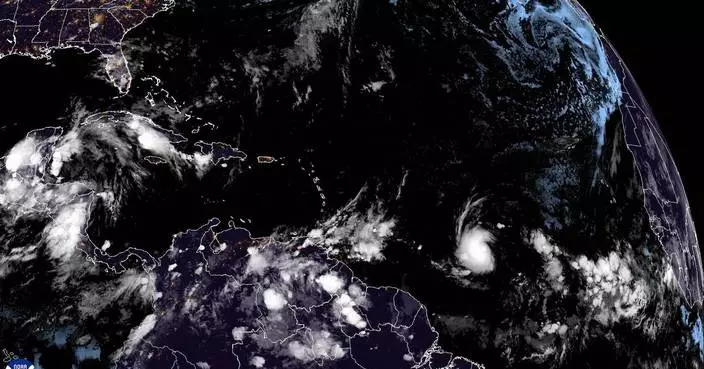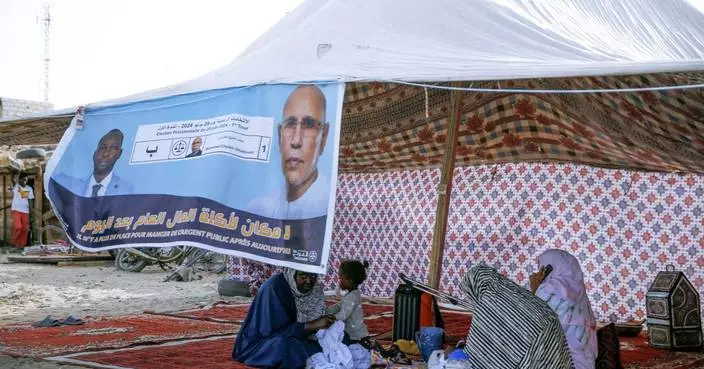NOGALES, Mexico (AP) — Ana Ruiz was dismayed seeing migrants from some countries released in the United States with orders to appear in immigration court while she and other Mexicans were deported on a one-hour bus ride to the nearest border crossing.
“They're giving priority to other countries,” Ruiz, 35, said after a tearful phone call to family in Mexico's southern state of Chiapas at the San Juan Bosco migrant shelter. The shelter's director says it is receiving about 100 deportees a day, more than double what it saw before President Joe Biden issued an executive order that suspends asylum processing at the U.S.-Mexico border when arrests for illegal crossings reach 2,500 a day.
Click to Gallery
Holding a Border Patrol-issued plastic bag containing her belongings, Mexican migrant Ana Ruiz, right, wipes her tears while talking to a family member at the San Juan Bosco migrant shelter in Nogales, Mexico, Tuesday, June 25, 2024, after she was deported back to her homeland from the U.S. The asylum halt, which took effect June 5 and has led a 40% decline in arrests for illegal crossings, applies to all nationalities but falls hardest on nationalities most susceptible to deportation _ specifically, Mexicans and those that Mexico agrees to take back. (AP Photo/Jae C. Hong)
NOGALES, Mexico (AP) — Ana Ruiz was dismayed seeing migrants from some countries released in the United States with orders to appear in immigration court while she and other Mexicans were deported on a one-hour bus ride to the nearest border crossing.
HOLD FOR STORY BY ELLIOT SPAGAT Female migrants, mostly Mexican nationals recently deported from the U.S., prepare to settle into their bunk beds for the night at the San Juan Bosco migrant shelter in Nogales, Mexico, Tuesday, June 25, 2024. Many migrants who fail interviews are deported to Nogales, a sprawling city in the Mexican state of Sonora, and end up at the shelter, where a giant fan in a former chapel offers relief from blistering summer heat. (AP Photo/Jae C. Hong)
Migrants, mostly Mexican nationals recently deported from the U.S., prepare to settle into their bunk beds for the night at the San Juan Bosco migrant shelter in Nogales, Mexico, Tuesday, June 25, 2024. (AP Photo/Jae C. Hong)
HOLD FOR STORY BY ELLIOT SPAGAT Two migrants sleep in their bunk bed at the San Juan Bosco migrant shelter in Nogales, Mexico, Tuesday, June 25, 2024. Many migrants who fail interviews are deported to Nogales, a sprawling city in the Mexican state of Sonora, and end up at the shelter, where a giant fan in a former chapel offers relief from blistering summer heat. (AP Photo/Jae C. Hong)
Migrants, mostly Mexican nationals deported back to their homeland from the U.S., eat their dinner at the San Juan Bosco migrant shelter in Nogales, Mexico, Tuesday, June 25, 2024. The Biden administration's asylum halt that has led to a 40% drop in arrests for illegal border crossings this month applies to all nationalities but falls hardest on nationalities most susceptible to being deported _ most notably, Mexicans. (AP Photo/Jae C. Hong)
Volunteer Edith Garcia prepares soup to serve migrants, mostly Mexican nationals deported from the U.S., at the San Juan Bosco migrant shelter in Nogales, Mexico, Tuesday, June 25, 2024. The Biden administration's asylum halt that has led to a 40% drop in arrests for illegal border crossings this month applies to all nationalities but falls hardest on nationalities most susceptible to being deported _ most notably, Mexicans. (AP Photo/Jae C. Hong)
Migrants, mostly Mexican nationals recently deported from the U.S., eat their dinner at the San Juan Bosco migrant shelter in Nogales, Mexico, Tuesday, June 25, 2024. The Biden administration's asylum halt that has led to a 40% drop in arrests for illegal border crossings this month applies to all nationalities but falls hardest on nationalities most susceptible to being deported - most notably, Mexicans. (AP Photo/Jae C. Hong)
A father and a daughter who declined to give their names sit in a chapel while waiting for dinner at the San Juan Bosco migrant shelter in Nogales, Mexico, Tuesday, June 25, 2024. Many migrants who fail interviews are deported to Nogales, a sprawling city in the Mexican state of Sonora, and end up at the shelter, where a giant fan in a former chapel offers relief from blistering summer heat. (AP Photo/Jae C. Hong)
Female migrants, mostly Mexican nationals recently deported from the U.S., eat their dinner at the San Juan Bosco migrant shelter in Nogales, Mexico, Tuesday, June 25, 2024. Many migrants who fail interviews are deported to Nogales, a sprawling city in the Mexican state of Sonora, and end up at the shelter, where a giant fan in a former chapel offers relief from blistering summer heat. (AP Photo/Jae C. Hong)
Mayra Mauricio, a Mexican migrant deported from the U.S., holds her smartphone to her ear to listen to a message left by a family member as she waits for dinner in a chapel at the San Juan Bosco migrant shelter in Nogales, Mexico, Tuesday, June 25, 2024. Many migrants who fail interviews are deported to Nogales, a sprawling city in the Mexican state of Sonora, and end up at the shelter, where a giant fan in a former chapel offers relief from blistering summer heat. (AP Photo/Jae C. Hong)
A migrant recently deported from the U.S. waits in line to shower at the San Juan Bosco migrant shelter in Nogales, Mexico, Tuesday, June 25, 2024. Many migrants who fail interviews are deported to Nogales, a sprawling city in the Mexican state of Sonora, and end up at the shelter, where a giant fan in a former chapel offers relief from blistering summer heat. (AP Photo/Jae C. Hong)
Luis Reynosa, a 17-year-old Mexican migrant recently deported back to his homeland, sits outside the San Juan Bosco migrant shelter while waiting for dinner in Nogales, Mexico, Tuesday, June 25, 2024. The Biden administration's asylum halt that has led to a 40% drop in arrests for illegal border crossings this month applies to all nationalities but falls hardest on nationalities most susceptible to being deported _ most notably, Mexicans. (AP Photo/Jae C. Hong)
Yazmani Gomes, left, arm-wrestles with Eliseo Lopez while waiting for dinner at San Juan Bosco migrant shelter in Nogales, Mexico, Tuesday, June 25, 2024. Many migrants who fail interviews are deported to Nogales, a sprawling city in the Mexican state of Sonora, and end up at the shelter, where a giant fan in a former chapel offers relief from blistering summer heat. (AP Photo/Jae C. Hong)
A migrant goes through his possessions as bags belonging to other migrants deported back to their homeland are piled up along the wall in a chapel at the San Juan Bosco migrant shelter in Nogales, Mexico, Tuesday, June 25, 2024. Mexicans accounted for 38% of border arrests in May, down from 85% in 2011 but still the highest nationality by far. In the Border Patrol's Tucson sector, the busiest corridor for illegal crossings for much of the last year, nearly three of every four arrests last month were of Mexicans, helping explain why the asylum ban has had more impact in Arizona. U.S. authorities say the 7-day average of daily arrests in the Tucson sector fell below 600 this week from just under 1,200 on June 2. (AP Photo/Jae C. Hong)
Juaquin Hernandez watches his 7-year-old son, Jonathan, play with a smartphone in the men's dorm at the San Juan Bosco migrant shelter in Nogales, Mexico, Tuesday, June 25, 2024. Many migrants who fail interviews are deported to Nogales, a sprawling city in the Mexican state of Sonora, and end up at the shelter, where a giant fan in a former chapel offers relief from blistering summer heat. (AP Photo/Jae C. Hong)
Female migrants who were recently deported from the U.S. sit in a chapel at the San Juan Bosco migrant shelter while waiting for dinner in Nogales, Mexico, Tuesday, June 25, 2024. Many migrants who fail interviews are deported to Nogales, a sprawling city in the Mexican state of Sonora, and end up at the shelter, where a giant fan in a former chapel offers relief from blistering summer heat. (AP Photo/Jae C. Hong)
Several migrants arrive at the San Juan Bosco migrant shelter to spend the night in Nogales, Mexico, Tuesday, June 25, 2024, after they were deported from the U.S. The Biden administration's asylum halt that has led to a 40% drop in arrests for illegal border crossings this month applies to all nationalities but falls hardest on nationalities most susceptible to being deported _ most notably, Mexicans. (AP Photo/Jae C. Hong)
Holding a Border Patrol-issued plastic bag containing her belongings, Mexican migrant Ana Ruiz, right, wipes her tears while talking to a family member at the San Juan Bosco migrant shelter in Nogales, Mexico, Tuesday, June 25, 2024, after she was deported back to her homeland from the U.S. The asylum halt, which took effect June 5 and has led a 40% decline in arrests for illegal crossings, applies to all nationalities but falls hardest on nationalities most susceptible to deportation _ specifically, Mexicans and those that Mexico agrees to take back. (AP Photo/Jae C. Hong)
The asylum halt, which took effect June 5 and has led to a 40% decline in arrests for illegal crossings, applies to all nationalities. But it falls hardest on those most susceptible to deportation — specifically, Mexicans and others Mexico agrees to take (Cubans, Haitians, Nicaraguans, Venezuelans). Lack of money for charter flights, sour diplomatic ties and other operational challenges make it more difficult to deport people to many countries in Africa, Asia, Europe and South America.
Homeland Security Secretary Alejandro Mayorkas said the U.S. is working with countries around the world to accept more of their deported citizens, citing challenges from diplomatic relations to speed producing travel documents.
“The reality is that it is easier to remove individuals to certain countries than other countries,” he said in an interview Wednesday in Tucson, Arizona. “We do remove individuals to Senegal, we do remove individuals to Colombia, we do remove individuals to India. It can be more difficult.”
Mexicans accounted for 38% of border arrests in May, down from 85% in 2011 but still the highest nationality by far. The Border Patrol's Tucson sector has been the busiest corridor for illegal crossings for much of the last year. Last month, nearly three of every four arrests there were of Mexicans, helping explain why the asylum ban has had more impact in Arizona. U.S. authorities say the seven-day average of daily arrests in the Tucson sector fell below 600 this week from just under 1,200 on June 2.
Border agents in Arizona have been severely tested since late 2022 by nationalities that are difficult to deport — first from Cuba and later Mauritania, Guinea and Senegal. Many cross near Lukeville, about a four-hour bus ride to a major processing center in Tucson.
Many Mexicans cross illegally much closer to Tucson in Nogales, Arizona, some by climbing over a wall with ladders made from material at a seatbelt plant on the Mexican side to try to disappear into homes and businesses within seconds. Others turn themselves in to border agents to claim asylum, entering through gaps in the wall that are being filled in. On Tuesday, a group of 49 predominantly Mexican migrants were waiting for agents.
Some are taken to the Border Patrol station in Nogales, where they can be held for six days if they express fear of being deported under the asylum halt and seek similar forms of protection that would allow them to remain but that have a much higher bar, such as the U.N. Convention Against Torture.
Most are taken to a cluster of giant white tents near Tucson International Airport, which opened in April 2021 for unaccompanied children. It now has space for 1,000 people, including single adults and families, who sleep on foam mattresses or raised beds.
On Tuesday, about a dozen people who said they feared deportation sat on benches in a cavernous room to hear instructions on the screening interview, which includes a four-hour window to call attorneys or others to prepare. They were then directed to one of 16 soundproof phone booths.
The Tucson processing center didn't even conduct screenings before Biden's asylum halt. That resulted in more migrants being released with orders to appear in U.S. immigration court, a practice that has plummeted in recent weeks. The screenings by asylum officers take about 90 minutes by phone.
Many migrants who fail interviews are deported to Nogales, a sprawling city in the Mexican state of Sonora, and end up at San Juan Bosco, where a giant fan in a former chapel offers relief from blistering summer heat.
Francisco Loureiro, who runs the shelter in a hardscrabble hillside neighborhood, said word has gotten out among Mexicans that they will be deported if they surrender to agents to seek asylum and that more will try to avoid being captured. He said one deported migrant accepted a smuggler's offer outside the shelter Tuesday to try to sneak across undetected.
Ruiz said she did not get a chance to explain to an asylum officer that she feared returning to Mexico due to cartel violence. “They were very direct, yes-or-no questions. You couldn't explain why you were afraid,” she said.
Mayorkas said complaints about the screening predate Biden's June order.
“I have confidence in our agents and officers that they are abiding by the guidelines, that our guidelines are strong, and we have the expertise to individuals who manifest fear,” he said.
Anahi Sandoval, 30, said she tried to avoid capture after crossing the border in Nogales and was abandoned by her smuggler in the desert. She said she fled Chiapas after she and her husband, who owned a doors and windows business, refused to be extorted by gangs; her husband was killed and she left her daughter with a relative.
“The Colombians get a pass but not the Mexicans,” said Sandoval, who failed her screening interview. “It makes me angry.”
Araceli Martinez, 32, said she fears returning home with her 14-year-old daughter to a physically abusive husband but no one asked her and she didn't know that she had to ask until she was on a bus to Mexico. Previously, Border Patrol agents had to ask migrants if they feared returning home. Under new rules, migrants must ask unprompted or express obvious signs of distress, such as crying.
Martinez was eager to spread a message to others: “People come thinking there is asylum, but there isn't.”
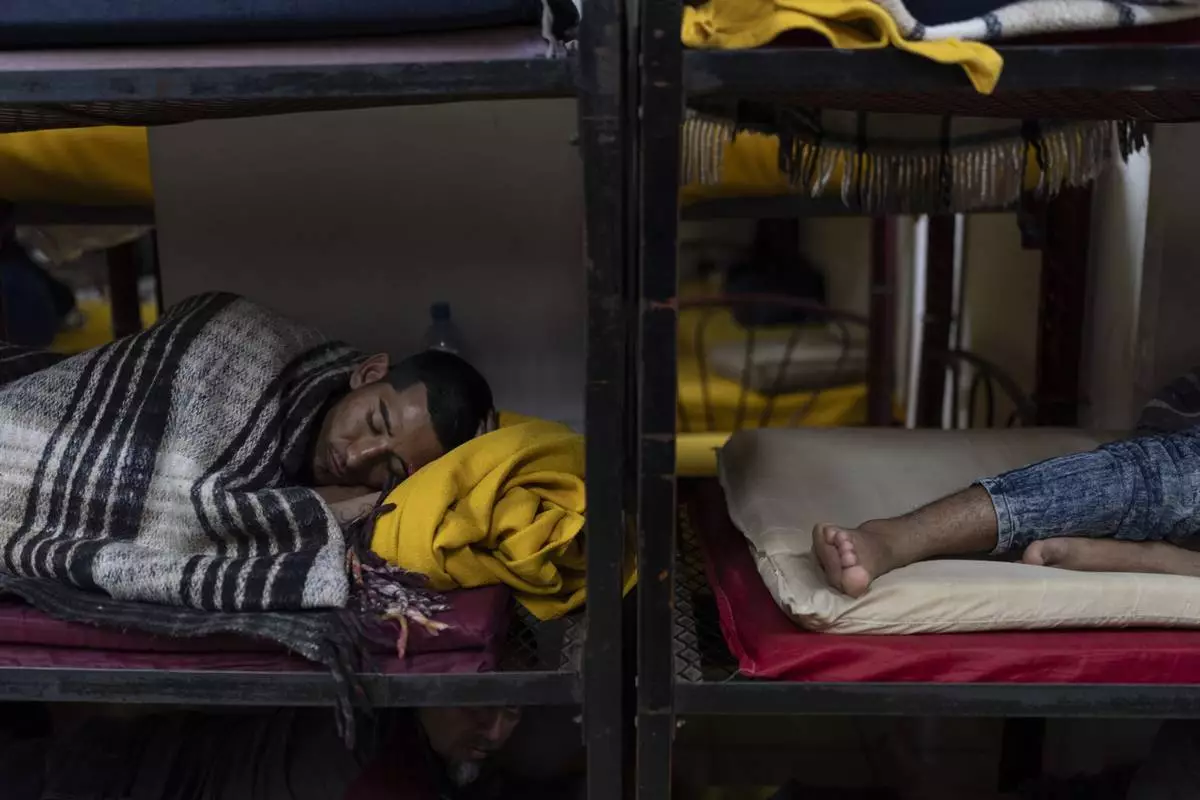
Two migrants sleep in their bunk bed at the San Juan Bosco migrant shelter in Nogales, Mexico, Tuesday, June 25, 2024. Many migrants who fail interviews are deported to Nogales, a sprawling city in the Mexican state of Sonora, and end up at the shelter, where a giant fan in a former chapel offers relief from blistering summer heat. (AP Photo/Jae C. Hong)
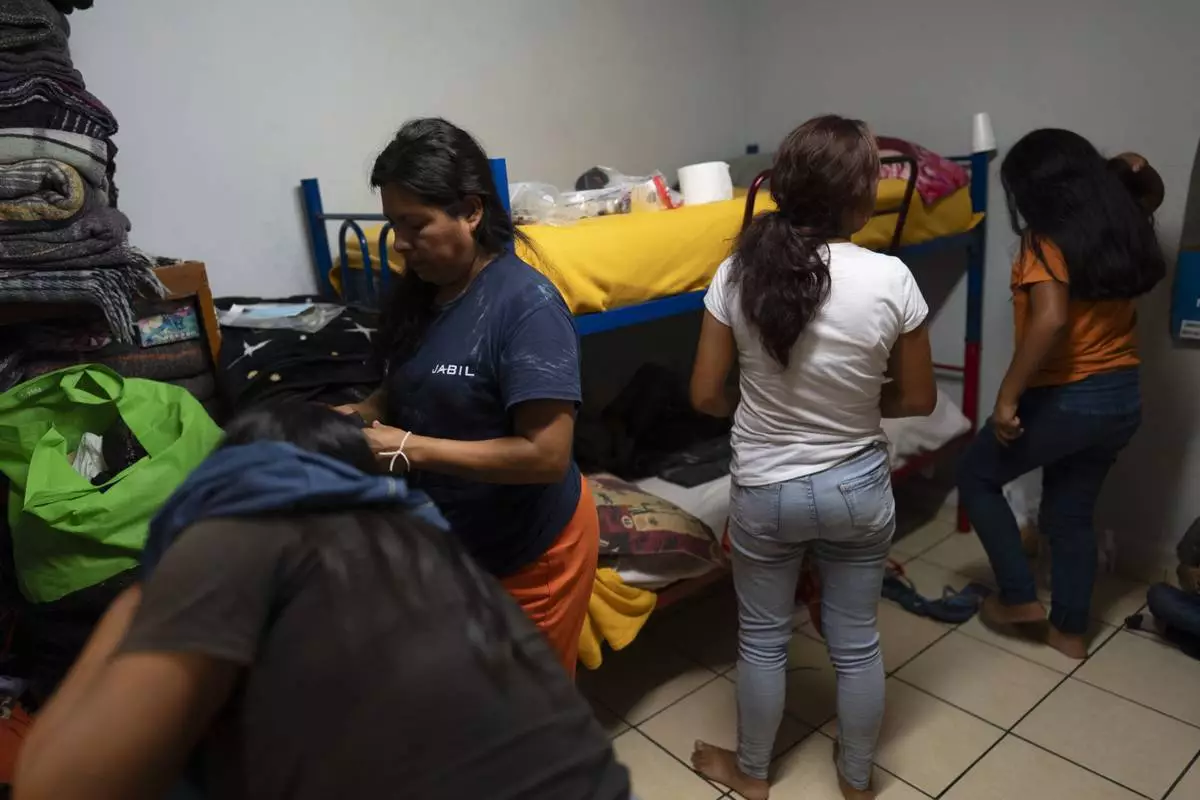
HOLD FOR STORY BY ELLIOT SPAGAT Female migrants, mostly Mexican nationals recently deported from the U.S., prepare to settle into their bunk beds for the night at the San Juan Bosco migrant shelter in Nogales, Mexico, Tuesday, June 25, 2024. Many migrants who fail interviews are deported to Nogales, a sprawling city in the Mexican state of Sonora, and end up at the shelter, where a giant fan in a former chapel offers relief from blistering summer heat. (AP Photo/Jae C. Hong)
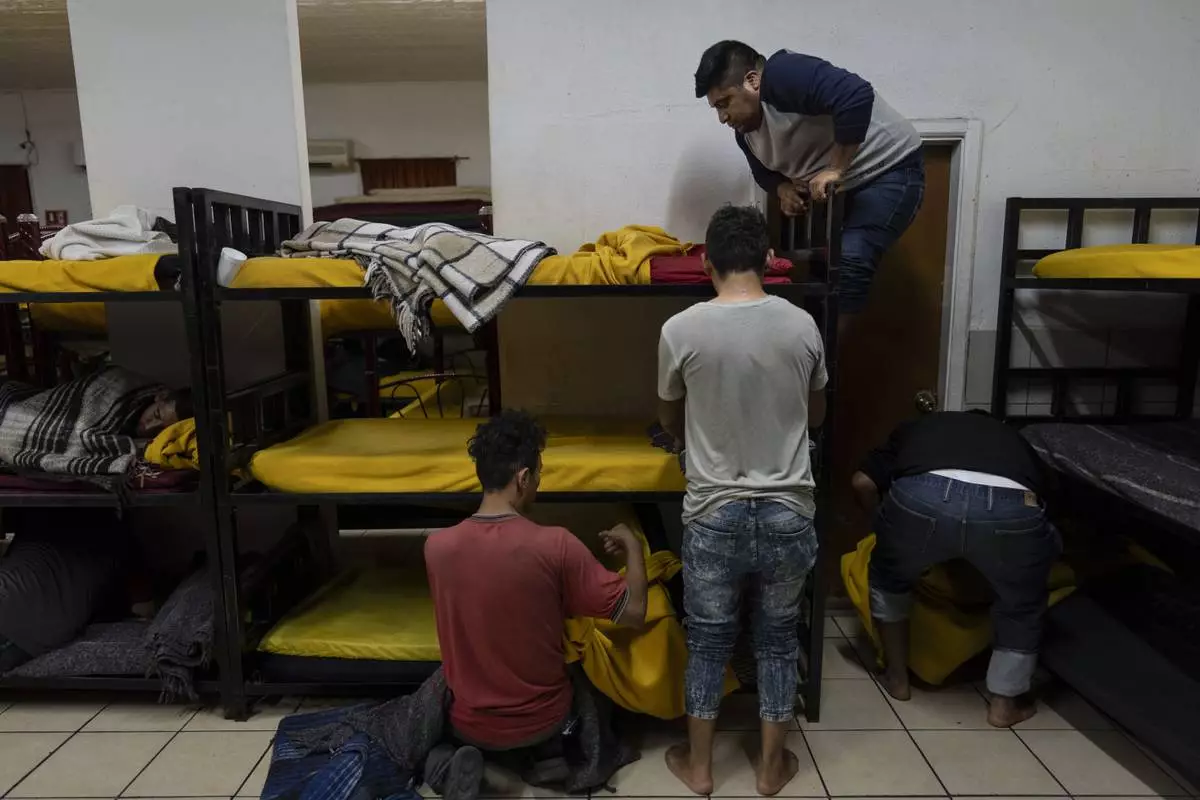
Migrants, mostly Mexican nationals recently deported from the U.S., prepare to settle into their bunk beds for the night at the San Juan Bosco migrant shelter in Nogales, Mexico, Tuesday, June 25, 2024. (AP Photo/Jae C. Hong)
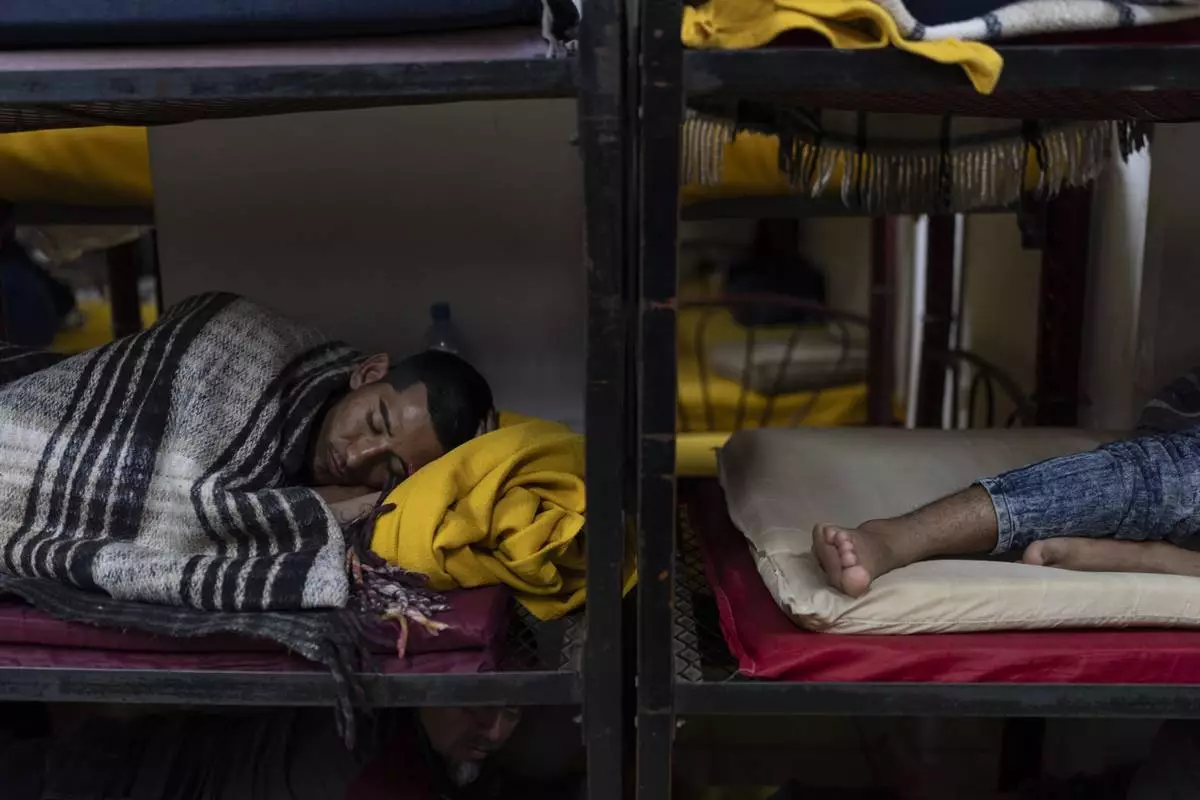
HOLD FOR STORY BY ELLIOT SPAGAT Two migrants sleep in their bunk bed at the San Juan Bosco migrant shelter in Nogales, Mexico, Tuesday, June 25, 2024. Many migrants who fail interviews are deported to Nogales, a sprawling city in the Mexican state of Sonora, and end up at the shelter, where a giant fan in a former chapel offers relief from blistering summer heat. (AP Photo/Jae C. Hong)
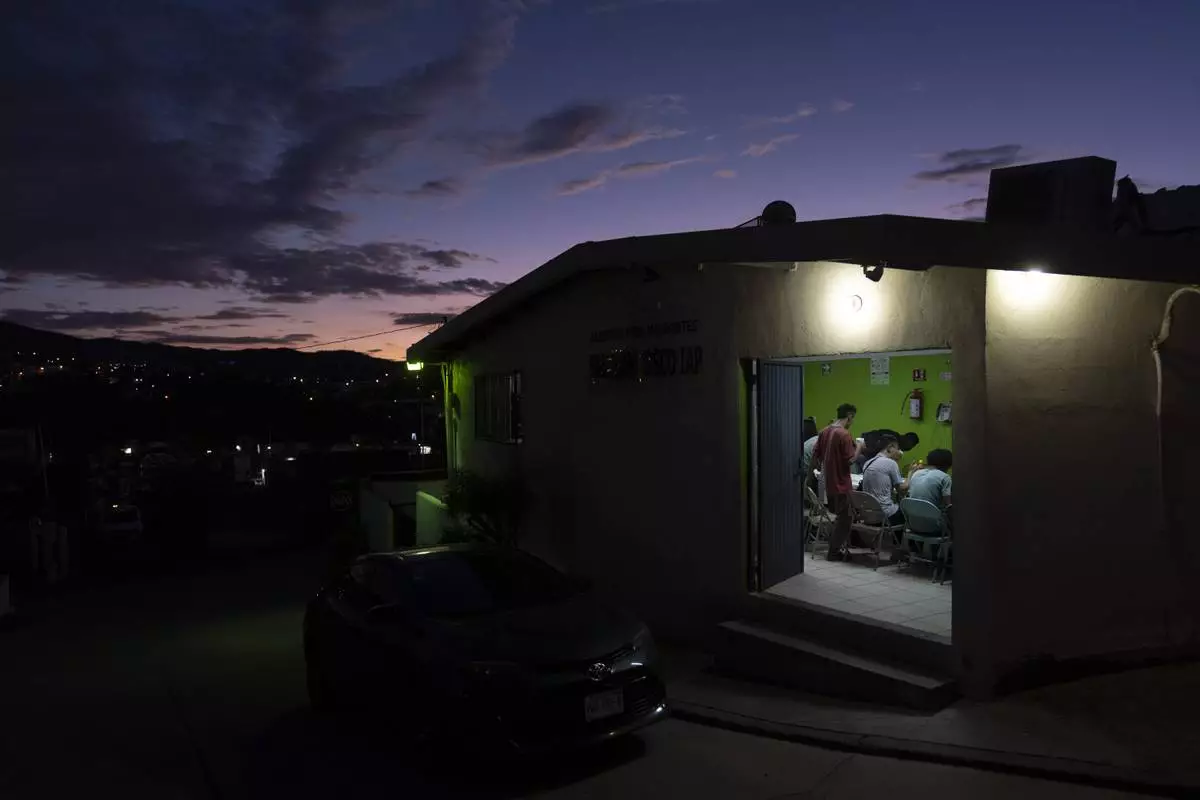
Migrants, mostly Mexican nationals deported back to their homeland from the U.S., eat their dinner at the San Juan Bosco migrant shelter in Nogales, Mexico, Tuesday, June 25, 2024. The Biden administration's asylum halt that has led to a 40% drop in arrests for illegal border crossings this month applies to all nationalities but falls hardest on nationalities most susceptible to being deported _ most notably, Mexicans. (AP Photo/Jae C. Hong)
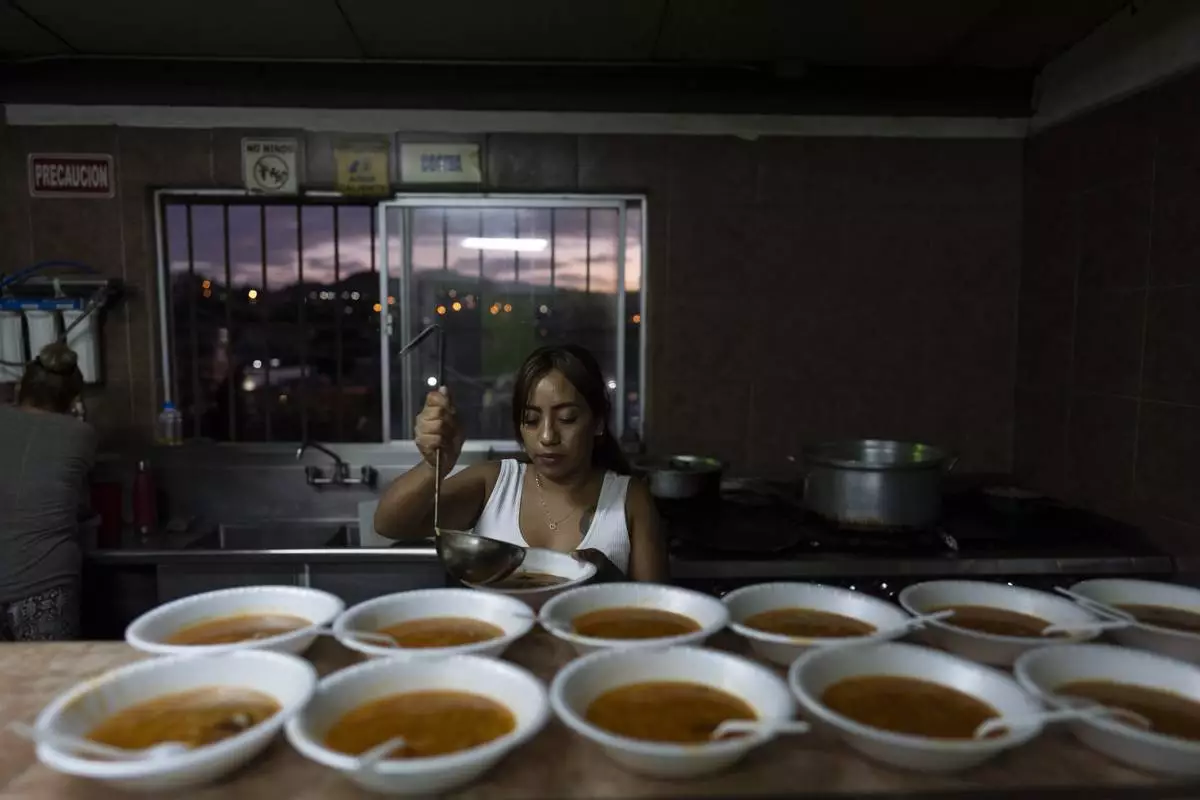
Volunteer Edith Garcia prepares soup to serve migrants, mostly Mexican nationals deported from the U.S., at the San Juan Bosco migrant shelter in Nogales, Mexico, Tuesday, June 25, 2024. The Biden administration's asylum halt that has led to a 40% drop in arrests for illegal border crossings this month applies to all nationalities but falls hardest on nationalities most susceptible to being deported _ most notably, Mexicans. (AP Photo/Jae C. Hong)
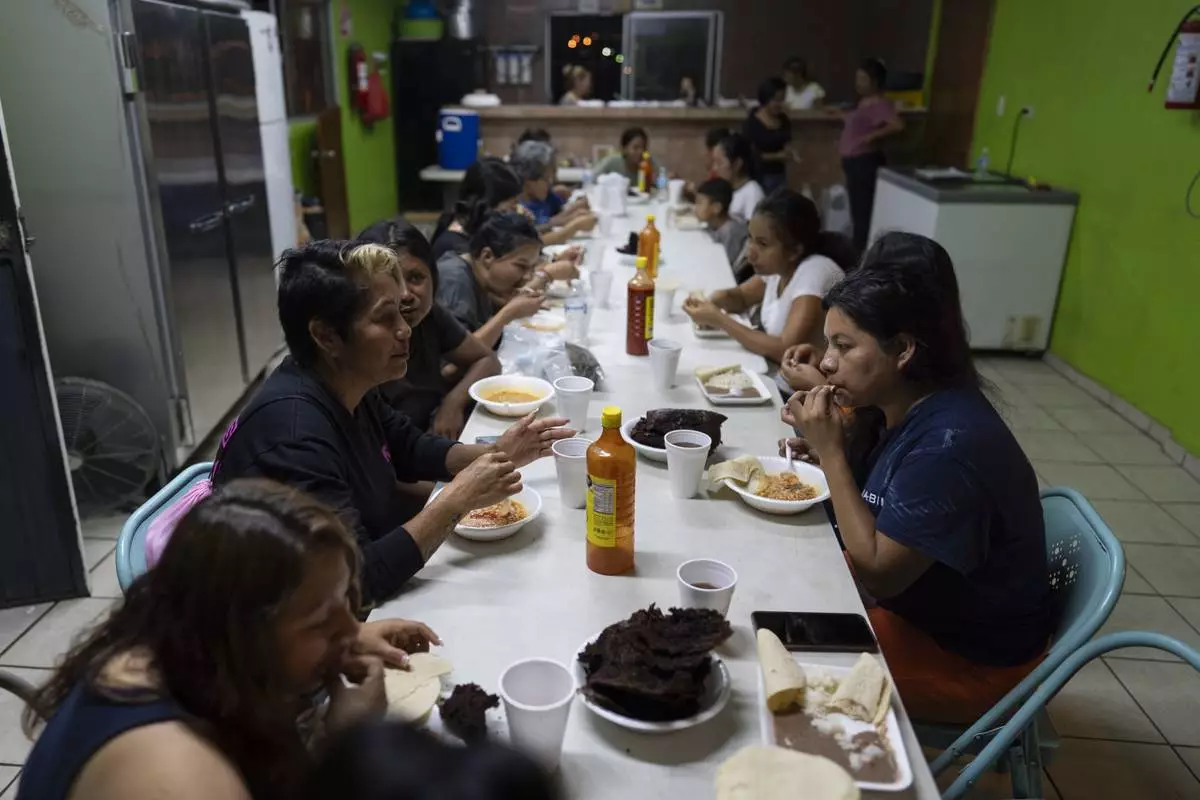
Migrants, mostly Mexican nationals recently deported from the U.S., eat their dinner at the San Juan Bosco migrant shelter in Nogales, Mexico, Tuesday, June 25, 2024. The Biden administration's asylum halt that has led to a 40% drop in arrests for illegal border crossings this month applies to all nationalities but falls hardest on nationalities most susceptible to being deported - most notably, Mexicans. (AP Photo/Jae C. Hong)
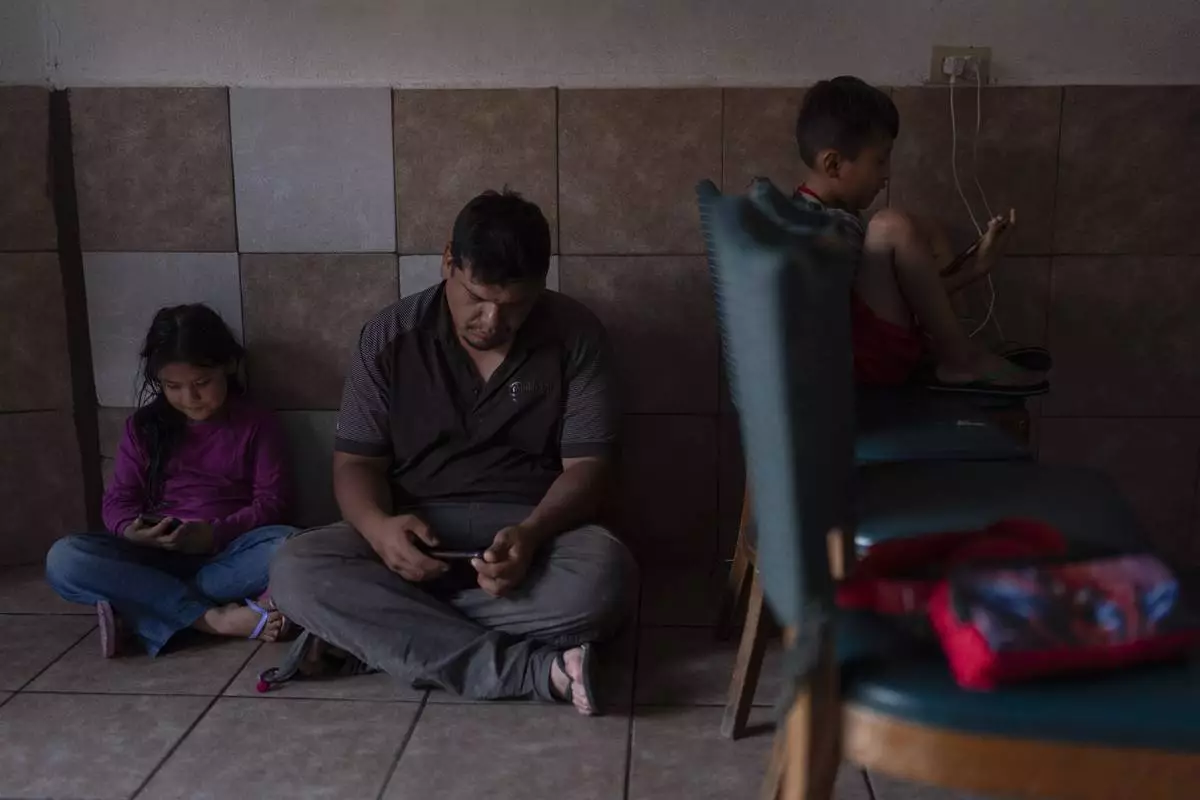
A father and a daughter who declined to give their names sit in a chapel while waiting for dinner at the San Juan Bosco migrant shelter in Nogales, Mexico, Tuesday, June 25, 2024. Many migrants who fail interviews are deported to Nogales, a sprawling city in the Mexican state of Sonora, and end up at the shelter, where a giant fan in a former chapel offers relief from blistering summer heat. (AP Photo/Jae C. Hong)
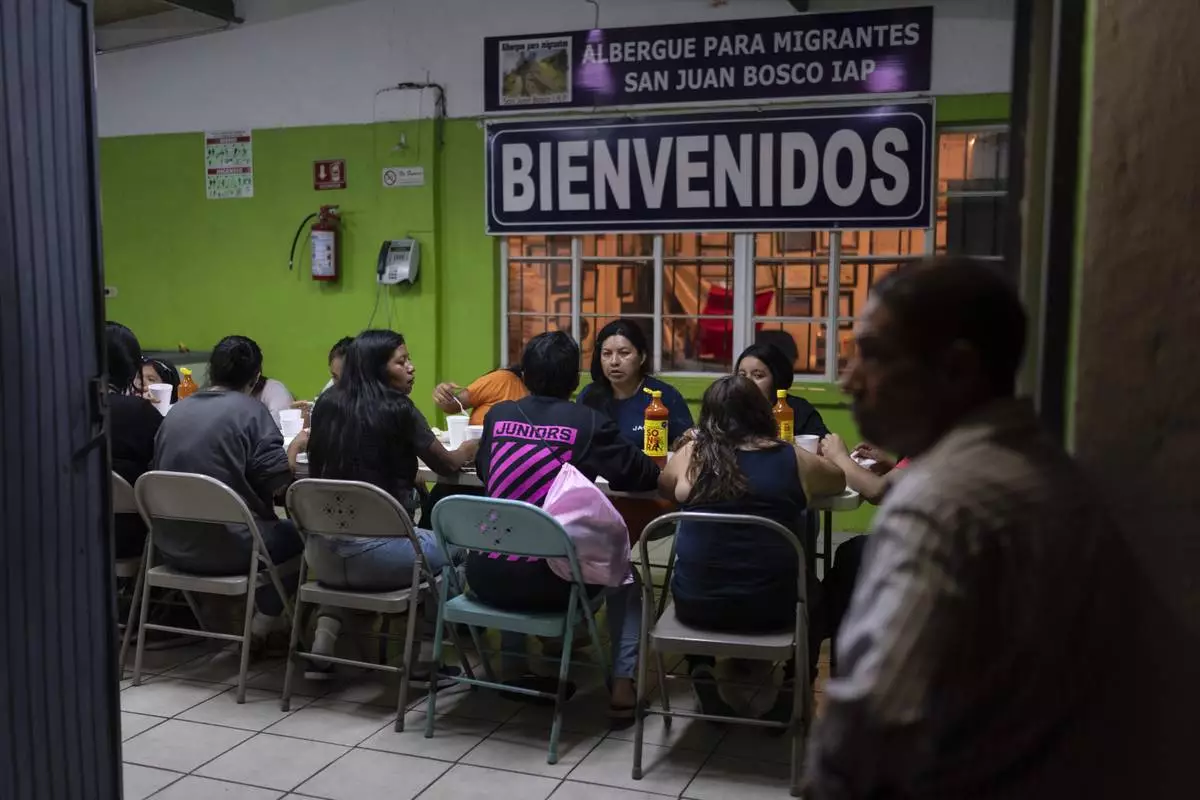
Female migrants, mostly Mexican nationals recently deported from the U.S., eat their dinner at the San Juan Bosco migrant shelter in Nogales, Mexico, Tuesday, June 25, 2024. Many migrants who fail interviews are deported to Nogales, a sprawling city in the Mexican state of Sonora, and end up at the shelter, where a giant fan in a former chapel offers relief from blistering summer heat. (AP Photo/Jae C. Hong)
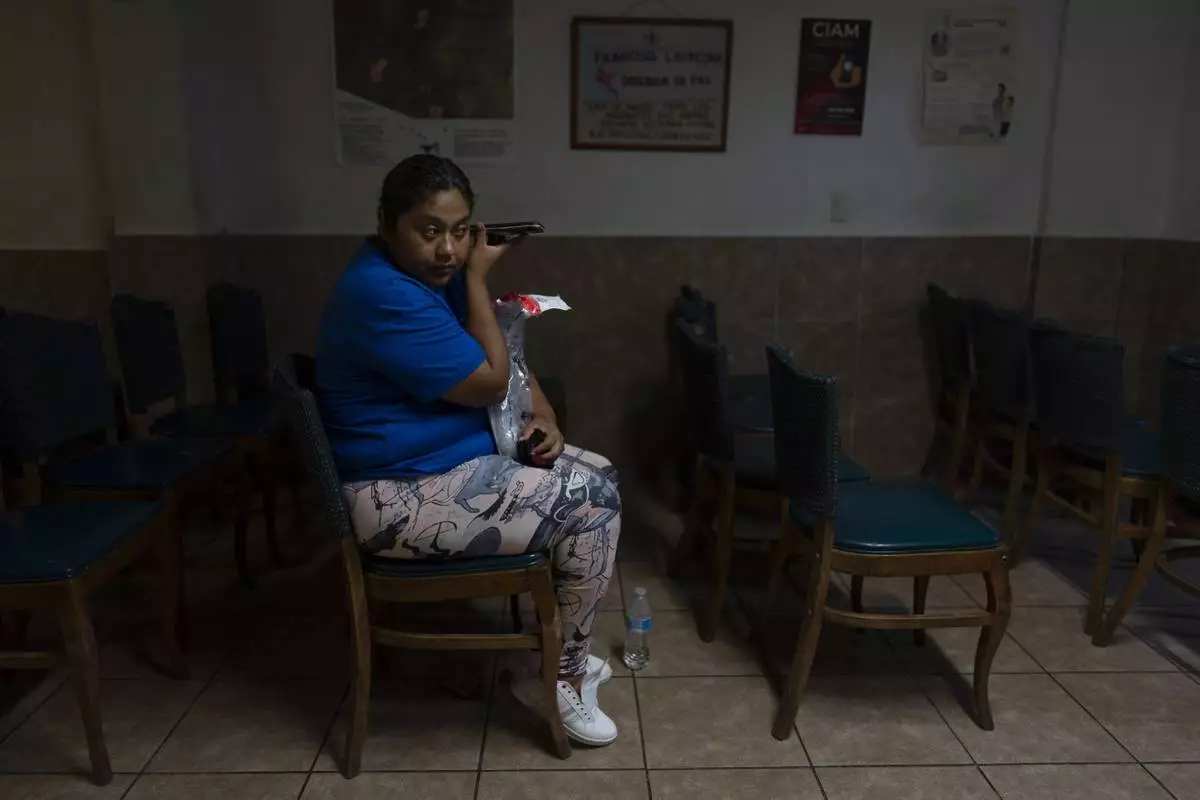
Mayra Mauricio, a Mexican migrant deported from the U.S., holds her smartphone to her ear to listen to a message left by a family member as she waits for dinner in a chapel at the San Juan Bosco migrant shelter in Nogales, Mexico, Tuesday, June 25, 2024. Many migrants who fail interviews are deported to Nogales, a sprawling city in the Mexican state of Sonora, and end up at the shelter, where a giant fan in a former chapel offers relief from blistering summer heat. (AP Photo/Jae C. Hong)
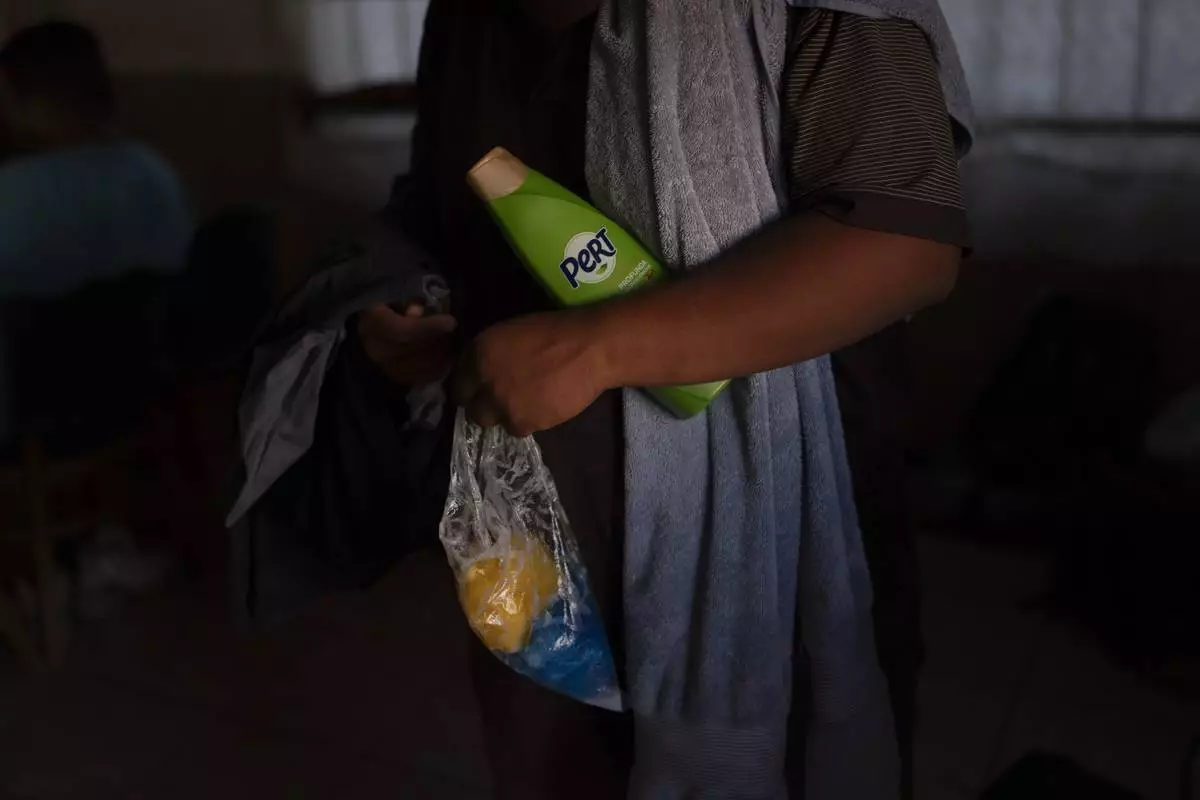
A migrant recently deported from the U.S. waits in line to shower at the San Juan Bosco migrant shelter in Nogales, Mexico, Tuesday, June 25, 2024. Many migrants who fail interviews are deported to Nogales, a sprawling city in the Mexican state of Sonora, and end up at the shelter, where a giant fan in a former chapel offers relief from blistering summer heat. (AP Photo/Jae C. Hong)
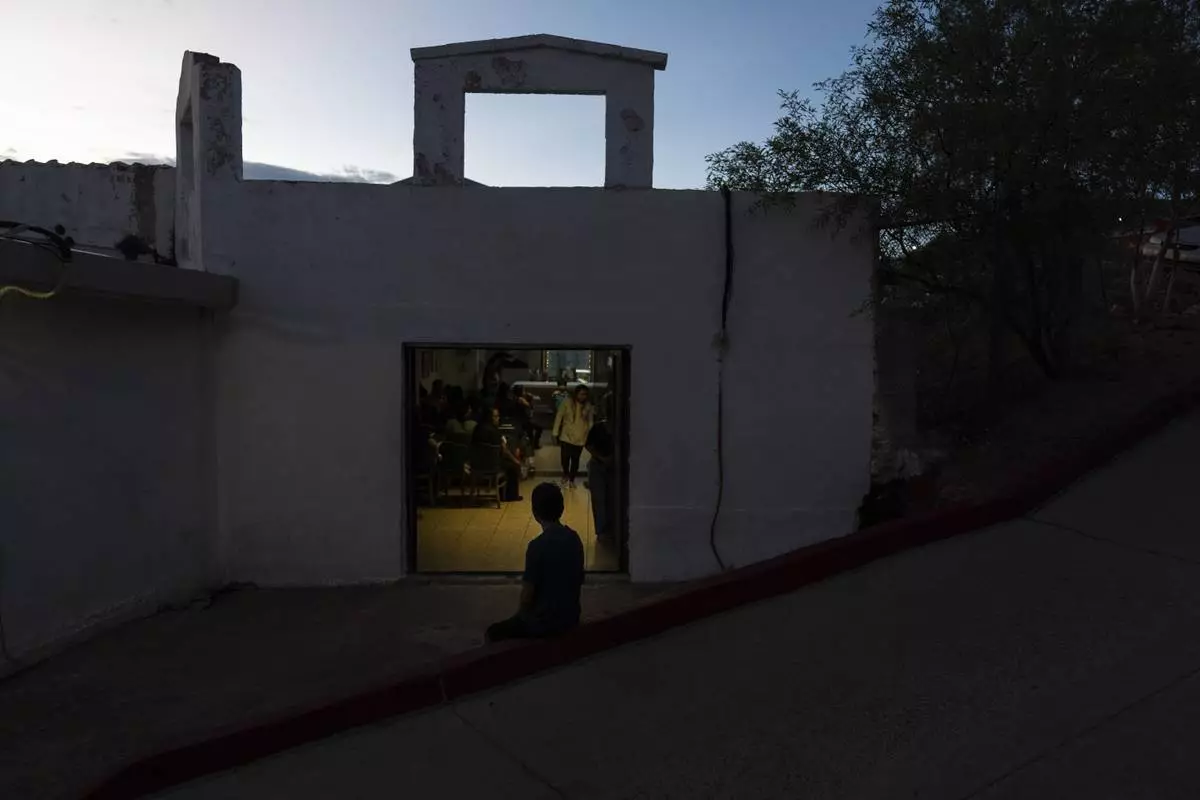
Luis Reynosa, a 17-year-old Mexican migrant recently deported back to his homeland, sits outside the San Juan Bosco migrant shelter while waiting for dinner in Nogales, Mexico, Tuesday, June 25, 2024. The Biden administration's asylum halt that has led to a 40% drop in arrests for illegal border crossings this month applies to all nationalities but falls hardest on nationalities most susceptible to being deported _ most notably, Mexicans. (AP Photo/Jae C. Hong)
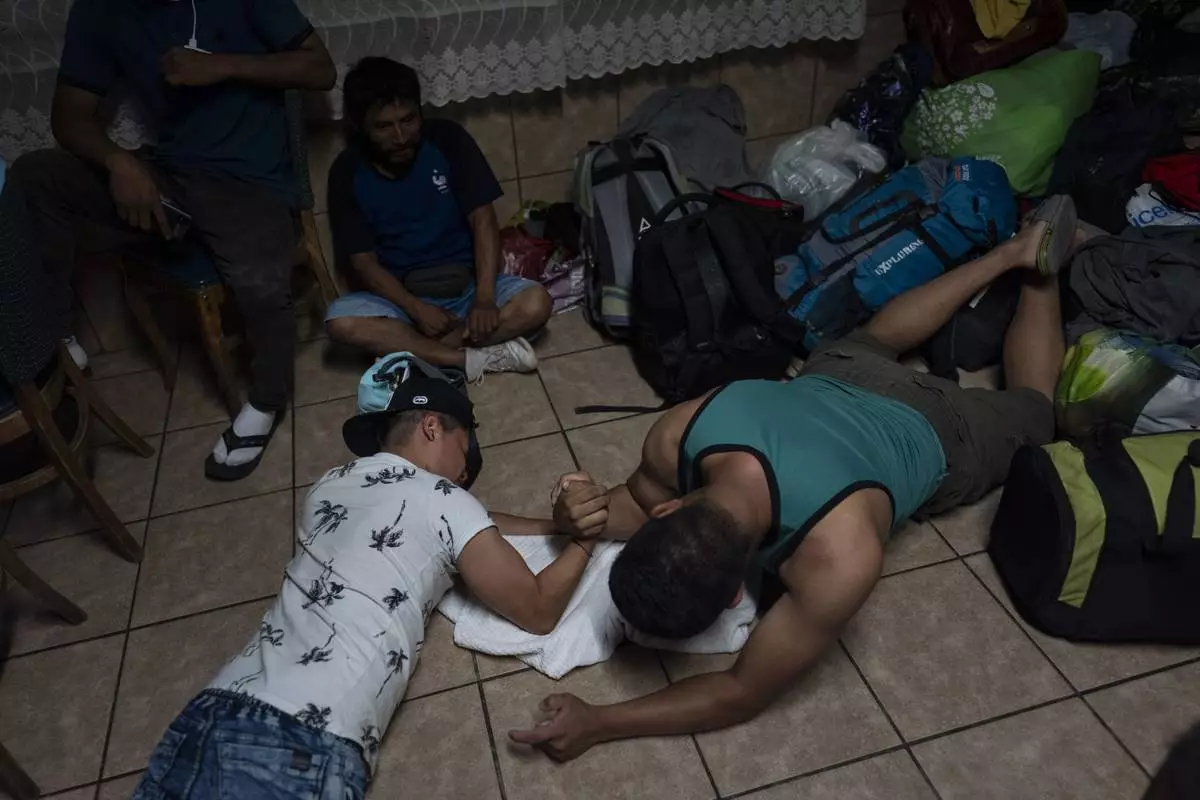
Yazmani Gomes, left, arm-wrestles with Eliseo Lopez while waiting for dinner at San Juan Bosco migrant shelter in Nogales, Mexico, Tuesday, June 25, 2024. Many migrants who fail interviews are deported to Nogales, a sprawling city in the Mexican state of Sonora, and end up at the shelter, where a giant fan in a former chapel offers relief from blistering summer heat. (AP Photo/Jae C. Hong)
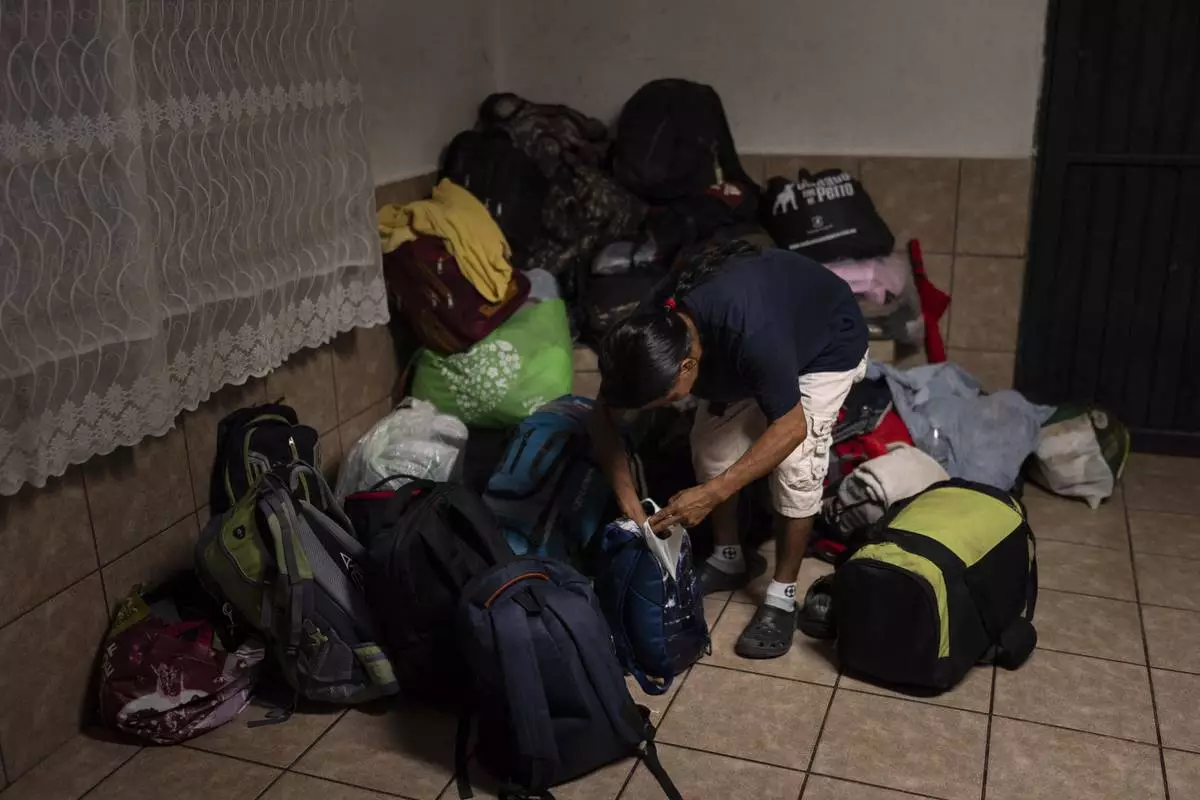
A migrant goes through his possessions as bags belonging to other migrants deported back to their homeland are piled up along the wall in a chapel at the San Juan Bosco migrant shelter in Nogales, Mexico, Tuesday, June 25, 2024. Mexicans accounted for 38% of border arrests in May, down from 85% in 2011 but still the highest nationality by far. In the Border Patrol's Tucson sector, the busiest corridor for illegal crossings for much of the last year, nearly three of every four arrests last month were of Mexicans, helping explain why the asylum ban has had more impact in Arizona. U.S. authorities say the 7-day average of daily arrests in the Tucson sector fell below 600 this week from just under 1,200 on June 2. (AP Photo/Jae C. Hong)
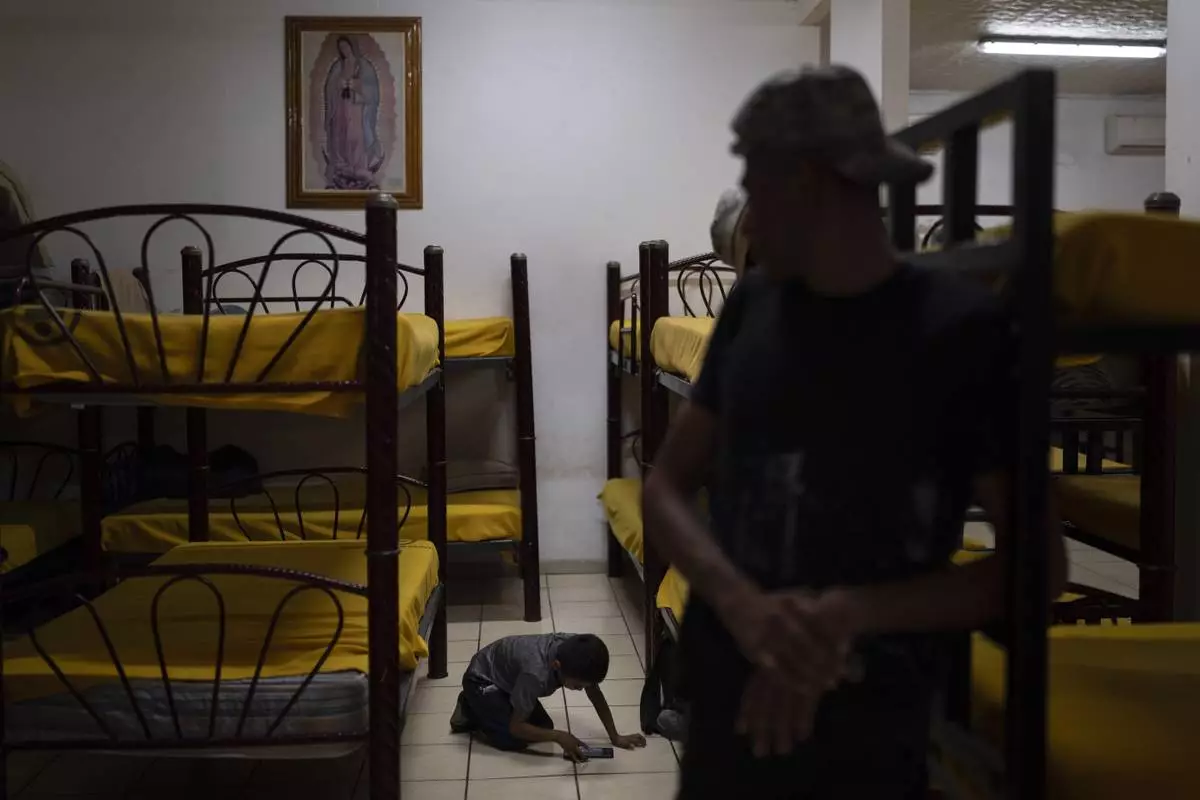
Juaquin Hernandez watches his 7-year-old son, Jonathan, play with a smartphone in the men's dorm at the San Juan Bosco migrant shelter in Nogales, Mexico, Tuesday, June 25, 2024. Many migrants who fail interviews are deported to Nogales, a sprawling city in the Mexican state of Sonora, and end up at the shelter, where a giant fan in a former chapel offers relief from blistering summer heat. (AP Photo/Jae C. Hong)
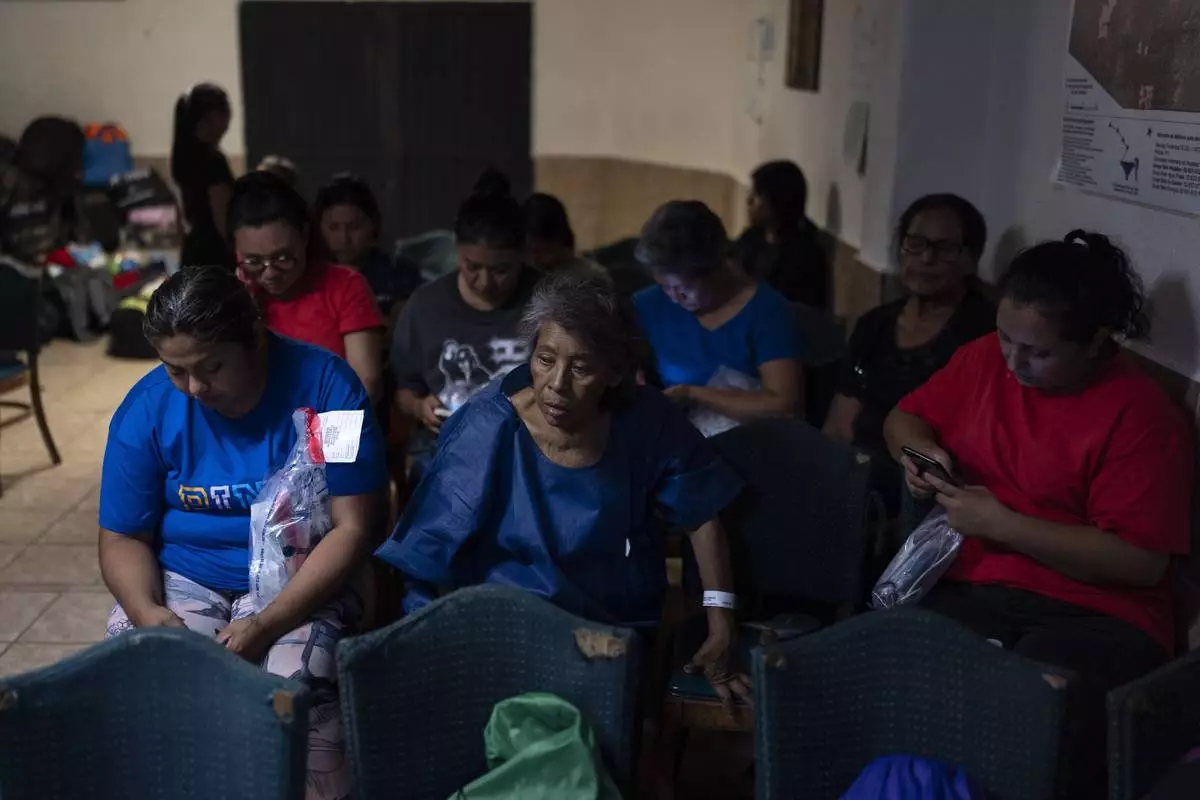
Female migrants who were recently deported from the U.S. sit in a chapel at the San Juan Bosco migrant shelter while waiting for dinner in Nogales, Mexico, Tuesday, June 25, 2024. Many migrants who fail interviews are deported to Nogales, a sprawling city in the Mexican state of Sonora, and end up at the shelter, where a giant fan in a former chapel offers relief from blistering summer heat. (AP Photo/Jae C. Hong)
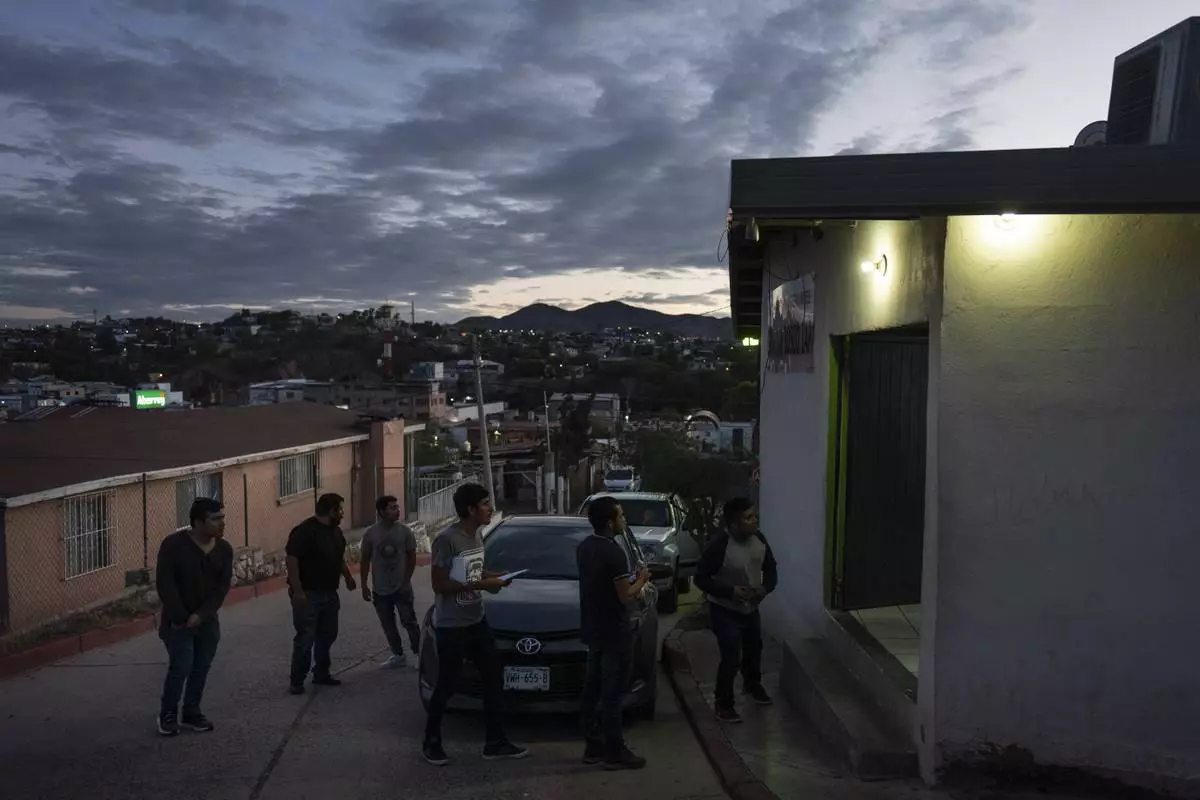
Several migrants arrive at the San Juan Bosco migrant shelter to spend the night in Nogales, Mexico, Tuesday, June 25, 2024, after they were deported from the U.S. The Biden administration's asylum halt that has led to a 40% drop in arrests for illegal border crossings this month applies to all nationalities but falls hardest on nationalities most susceptible to being deported _ most notably, Mexicans. (AP Photo/Jae C. Hong)
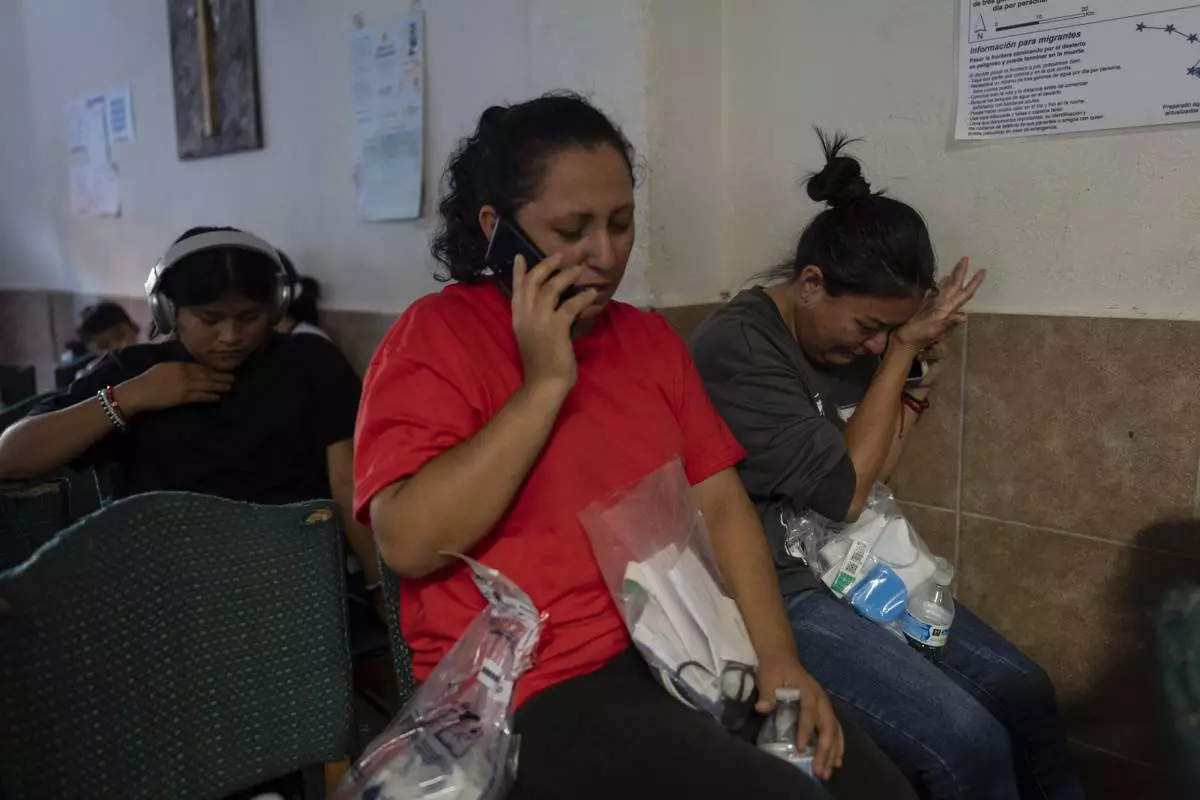
Holding a Border Patrol-issued plastic bag containing her belongings, Mexican migrant Ana Ruiz, right, wipes her tears while talking to a family member at the San Juan Bosco migrant shelter in Nogales, Mexico, Tuesday, June 25, 2024, after she was deported back to her homeland from the U.S. The asylum halt, which took effect June 5 and has led a 40% decline in arrests for illegal crossings, applies to all nationalities but falls hardest on nationalities most susceptible to deportation _ specifically, Mexicans and those that Mexico agrees to take back. (AP Photo/Jae C. Hong)
WASHINGTON (AP) — U.S., European and Arab mediators are pressing to keep stepped-up cross-border attacks between Israel and Lebanon's Hezbollah militants from spiraling into a wider Middle East war that the world has feared for months.
Hopes are lagging for a cease-fire anytime soon in Israel's conflict with Hamas in Gaza that would calm attacks by Hezbollah and other Iranian-allied militias. With that in mind, American and European officials are delivering warnings to Hezbollah, which is far stronger than Hamas but seen as overconfident, about taking on the military might of Israel, current and former diplomats say.
They are warning that the group should not count on the United States or anyone else being able to hold off Israeli leaders if they decide to execute battle-ready plans for an offensive into Lebanon. And Hezbollah should not count on its fighters' ability to handle whatever would come next.
On both sides of the Lebanese border, escalating strikes between Israel and Hezbollah, one of the region's best-armed fighting forces, appeared at least to level off this past week. While daily strikes still pound the border area, the slight shift offered hope of easing immediate fears, which had prompted the U.S. to send an amphibious assault ship with a Marine expeditionary force to join other warships in the area in hopes of deterring a wider conflict.
It's not clear whether Israel or Hezbollah has decided to ratchet down attacks to avoid triggering an Israeli invasion into Lebanon, said Gerald Feierstein, a former senior U.S. diplomat in the Middle East. Despite this past week's plateauing of hostilities, “it certainly seems the Israelis are still ... arranging themselves in the expectation that there will be some kind of conflict ... an entirely different magnitude of conflict," he said.
The message being delivered to Hezbollah is “don't think that you're as capable as you think you are,” he said.
Beginning the day after Hamas' Oct. 7 attacks on Israel triggered the war in Gaza, Hezbollah has launched rockets into northern Israel and vowed to continue until a cease-fire takes hold. Israel has hit back, with the violence forcing tens of thousands of civilians from the border in both countries. Attacks intensified this month after Israel killed a top Hezbollah commander and Hezbollah responded with some of its biggest missile barrages.
U.N. humanitarian chief Martin Griffiths used the word “apocalyptic” to describe a war that could result. Both Israel and Hezbollah, the dominant force in politically fractured Lebanon, have the power to cause heavy casualties.
“Such a war would be a catastrophe for Lebanon," Defense Secretary Lloyd Austin said as he met recently with Israeli Defense Minister Yoav Gallant at the Pentagon. “Another war between Israel and Hezbollah could easily become a regional war, with terrible consequences for the Middle East.”
Gallant, in response, said, “We are working closely together to achieve an agreement, but we must also discuss readiness on every possible scenario.”
Analysts expect other Iran-allied militias in the region would respond far more forcefully than they have for Hamas, and some experts warn of ideologically motivated militants streaming into the region to join in. Europeans fear destabilizing refugee flows.
While Iran, which is preoccupied with a political transition at home, shows no sign of wanting a war now, it sees Hezbollah as its strategically vital partner in the region — much more so than Hamas — and could be drawn in.
"Obviously if it does look like things are going seriously south for the Israelis, the U.S. will intervene,” Feierstein said. “I don't think that they would see any alternative to that.”
While the U.S. helped Israel knock down a barrage of Iranian missiles and drones in April, the U.S. likely would not do as well assisting Israel's defense against any broader Hezbollah attacks, said Gen. CQ Brown, chairman of the Joint Chiefs of Staff. It is harder to fend off the shorter-range rockets that Hezbollah fires routinely across the border, he said.
The Israeli army is stretched after a nearly 9-month war in Gaza, and Hezbollah holds an estimated arsenal of some 150,000 rockets and missiles capable of striking anywhere in Israel. Israeli leaders, meanwhile, have pledged to unleash Gaza-like scenes of devastation on Lebanon if a full-blown war erupts.
White House senior adviser Amos Hochstein, President Joe Biden's point person on Israel-Hezbollah tensions, has not been successful so far in getting the two sides to dial back the attacks.
The French, who have ties as Lebanon's former colonial power, and other Europeans also are mediating, along with the Qataris and Egyptians.
White House officials have blamed Hezbollah for escalating tensions and said it backs Israel’s right to defend itself. The Biden administration also has told the Israelis that opening a second front is not in their interest. That was a point hammered home to Gallant during his latest talks in Washington with Secretary of State Antony Blinken, Austin, CIA Director William Burns, national security adviser Jake Sullivan, Hochstein and others.
“We’re going to continue to help Israel defend itself; that’s not going to change,” White House national security spokesman John Kirby said. “But as for a hypothetical — specifically with respect to the northern border line ... — again, we want to see no second front opened, and we want to see if we can’t resolve the tensions out there through diplomatic processes.”
White House officials, however, are not discounting the real possibility that a second front in the Mideast conflict could open.
In conversations with Israeli and Lebanese officials and other regional stakeholders, there is agreement that “a major escalation is not in anybody’s interest,” a senior Biden administration official said.
The official, who was not authorized to comment publicly about White House deliberations and spoke on condition of anonymity, bristled at the “purported logic” of Hezbollah leader Hassan Nasrallah arguing that Israel would see an end to Hezbollah attacks by reaching a cease-fire agreement with Hamas in Gaza.
But the official also acknowledged that an elusive cease-fire deal in Gaza would go a long way in quieting tensions on the Israel-Lebanon border.
Biden introduced a three-phase deal four weeks ago that would lead to an extended truce and the release of Israeli hostages and Palestinian prisoners, but negotiations between Israel and Hamas appear to have stalled. A senior Biden administration official said Saturday that the U.S. has presented new language to Egypt and Qatar intermediaries aimed at trying to jumpstart the negotiations. The official spoke on condition of anonymity to discuss an effort that the White House has yet to publicly unveil.
Without a cease-fire, there's still hope that talked-of Israeli plans to wind down major combat in the southern city of Rafah and elsewhere in Gaza could lead Hezbollah to temper its firing of rockets into Israel, said Randa Slim, a senior fellow at the Middle East Institute.
But without a cease-fire in Gaza, any temporary calm on the Lebanon-Israeli border “is not enough," Slim said.
Associated Press writers Abby Sewell in Beirut, Josef Federman in Jerusalem, and Matthew Lee, Tara Copp, Lolita C. Baldor and Aamer Madhani contributed to this report.

Mourners carry the coffins of Hezbollah fighters Mohammed Hussein Qassem and Abbas Ahmed Soror, who were killed by an Israeli strike, during their funeral procession in Aita al-Shaab village, south Lebanon, Saturday, June 29, 2024. (AP Photo/Mohammed Zaatari)

Defense Secretary Lloyd Austin, right, and Israeli Defense Minister Yoav Gallant, second from left, sit down for a meeting at the Pentagon in Washington, Tuesday, June 25, 2024. The two, who have been in weekly contact since the Hamas attack on Israel in October, are expected to discuss Israeli operations in Gaza, humanitarian efforts in the region, and tension with Hezbollah in Lebanon. (AP Photo/Susan Walsh)

Defense Secretary Lloyd Austin, standing right, and Israeli Defense Minister Yoav Gallant, standing left, listen to the playing of the Israeli National Anthem during an arrival ceremony at the Pentagon in Washington, Tuesday, June 25, 2024. The two, who have been in weekly contact since the Hamas attack on Israel in October, are expected to discuss Israeli operations in Gaza, humanitarian efforts in the region, and tension with Hezbollah in Lebanon. (AP Photo/Susan Walsh)




















